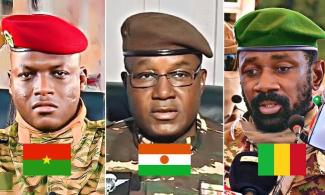
The West African regional body which took this position at the conclusion of its extraordinary session of the Mediation and Security Council (MSC) at the Ministerial Level which was held in Abuja, Nigeria’s capital on Thursday, called for the activation of the ECOWAS Standby Force to combat the existential threat of terrorism including Burkina Faso, Mali, and Niger.
The Economic Community of West African States (ECOWAS) has urged Burkina Faso, Mali and the Republic of Niger who recently announced their exit from the Community, to prioritise dialogue and reconciliation.
The West African regional body which took this position at the conclusion of its extraordinary session of the Mediation and Security Council (MSC) at the Ministerial Level which was held in Abuja, Nigeria’s capital on Thursday, called for the activation of the ECOWAS Standby Force to combat the existential threat of terrorism including Burkina Faso, Mali, and Niger.
Speaking at the conclusion of the session, Nigeria’s Minister of Foreign Affairs, and Chairman of the MSC, Ambassador Yusuf Tuggar, said the decision of Burkina Faso, Niger and Mail to withdraw from the community has presented yet another challenge.
He said, however, members are heartened by the spirit of cooperation to resolve the challenge that upholds the values of the community.
Ambassador Tuggar noted that “We must carry forward the momentum generated in this session and continue our efforts to engage with the concerned member states in the spirit of understanding and reconciliation.”
He underscored the detrimental impact that the withdrawal of Burkina Faso, Mali, and Niger could have on their citizens.
According to Ambassador Tuggar, “The choice of these three countries to exit ECOWAS would not only bring hardship to their people but also undermine regional integration efforts.”
He further reinforced ECOWAS’s commitment to dialogue, diplomacy, and reconciliation as the cornerstone of its approach to resolving disputes within the community.
Ambassador Tuggar, while addressing the implications of such decisions on the broader integration process, characterised them as a small setback rather than a complete disruption of African integration.
He stressed the significant movement and interconnection of people within the ECOWAS region, emphasising the strength of current integration accomplishments despite present difficulties.
In addition to regional integration and diplomacy, the council session focused on the pressing issue of terrorism.
A significant decision was the call for the activation of the ECOWAS Standby Force to combat the existential threat of terrorism that looms over the community, including Burkina Faso, Mali, and Niger.
Despite the imposition of sanctions, ECOWAS has continued to support these countries in their counter-terrorism efforts.
The President of the ECOWAS Commission, Dr Omar Alieu Touray, affirmed that ECOWAS remains committed to reflecting the aspirations of its citizens for accountable and democratic governance.
Touray said, “We have moved from ECOWAS of states to ECOWAS of peoples, where the demands for democratic governance and transparency are paramount.”
He underscored the organization’s dedication to promoting these ideals across all member states.
As the session concluded, ECOWAS reiterated its dedication to fostering good governance, strengthening institutions, and ensuring the well-being of its citizens.
The community said it stands united in its efforts towards dialogue, reconciliation, and combating terrorism, embodying the spirit of cooperation and unity that defines ECOWAS.